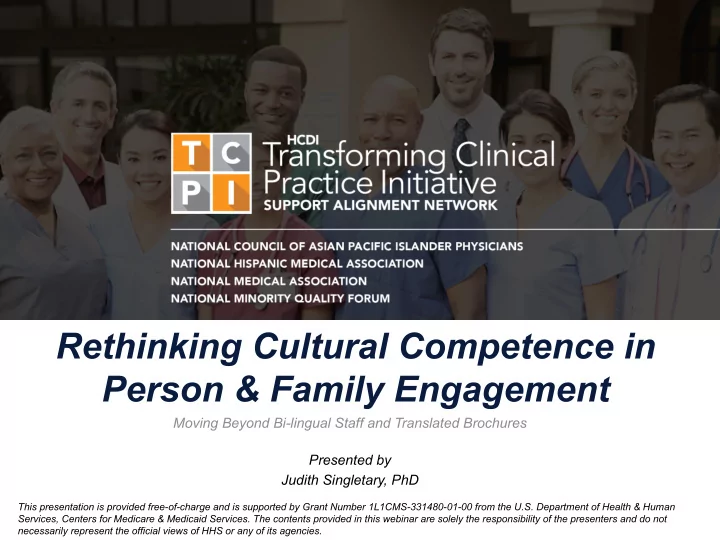

Rethinking Cultural Competence in Person & Family Engagement Moving Beyond Bi-lingual Staff and Translated Brochures Presented by Judith Singletary, PhD This presentation is provided free-of-charge and is supported by Grant Number 1L1CMS-331480-01-00 from the U.S. Department of Health & Human Services, Centers for Medicare & Medicaid Services. The contents provided in this webinar are solely the responsibility of the presenters and do not necessarily represent the official views of HHS or any of its agencies.
Judith Singletary, PhD
You will learn: • The importance of adopting an intersectional approach to cultural competence in person & family engagement (PFE), which recognizes the experience of multiple social locations – race/ethnicity, social class, sexuality, gender and age – as central to patient and family health beliefs, behaviors, needs and perceptions; • That multiple social locations in life and social context are critical to cultural competence, and key in the framing of health-related messages and meanings, and • How to integrate intersectional cultural competency into your practice’s PFE.
Person & Family Engagement: A CMS Quality Strategy • Paradigm shift in responsibility for healthcare outcomes • A new system approach to ensuring safety and quality • Goals include: – Partnerships with patients, families and caregivers – Shared decision-making process – Developing culturally-sensitive and understandable care plans • Why Cultural Competence? – Key to providing patient-centered care and engaging persons and families, and – Achieving foundational CMS principal of eliminating disparities.
Evolution of Cultural Competence • “a set of congruent behaviors, attitudes and policies that come together in a system, agency or among professionals and enable that system, agency or those professionals to work effectively in cross-cultural situations (Cross et al., 1989) • “the ability of systems to provide care to patients with diverse values, beliefs and behaviors, including tailoring delivery to meet patients’ social, cultural and linguistic needs” (Betancourt et al., 2003) • Too often an exercise in sensitizing clinicians to the social predicaments of racial/ethnic groups, or the “others” • Made use of simplistic cultural prescriptions about racial/ethnic groups – Viewed culture as “group membership” – Recognized fixed sets of characteristics or cultural “traits”
Evolution of Cultural Competence • Failed to recognize diversity within racial/ethnic groups; diminished the importance of other salient characteristics: – Social class – Sexuality – Gender – Age – Disability • Often results in culturally and linguistically competent “check-lists” – Bi-lingual staff – Racially/ethnically diverse staff – Translated, racially-diverse materials – Eat/Don’t Eat food lists by race/ethnicity • Important, but ignores multi-dimensionality of culture
Intersectional Approach to Cultural Competence and PFE • Engagement in the care experience: – Must be mutual and sustained – Interactions must be authentic and intentional • Consideration must extend beyond recognition of social determinants of health to: – Preferences – Strengths – Beliefs – Culture • The “lived experience” • Individuals hold multiple social statuses (locations): – Experienced simultaneously – Mutually reinforced – Should be considered together – Self-defining and fluid • Persons & families hold both disadvantaged and advantaged statuses; directly or indirectly impact health experience
Intersectional Approach to Cultural Competence and PFE • As important as uncovering social determinants of health, studies identify full range of interlocking factors affecting health experiences of vulnerable groups. • Quantitative Studies: – Examine combined effects of race and gender and impact on health • Qualitative Studies – Health effects of discrimination and powerlessness compounded for those with multiple devalued social locations, i.e. race/ethnic minority and disability
Integrating Intersectional Cultural Competence in Physician Practices • Provider/Staff Self-Awareness Exercise • Patient Cultural Assessment Tools • Integration Across the Continuum of PFE
Questions?
Tha hank You! Contact Information: Judith Singletary, PhD judithsingletary@verizon.net
Recommend
More recommend